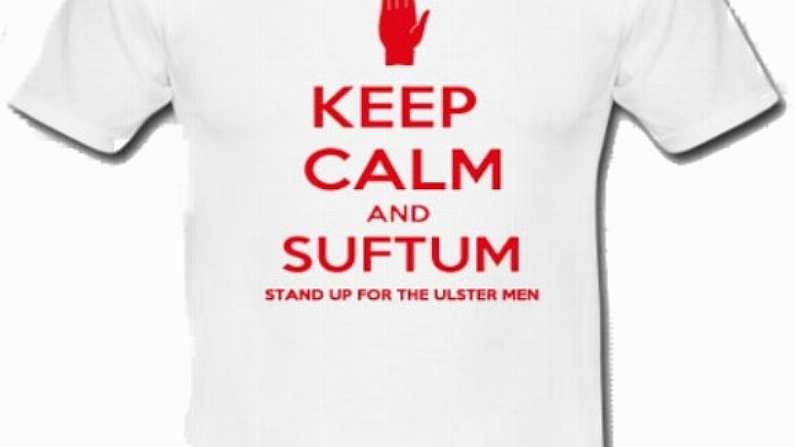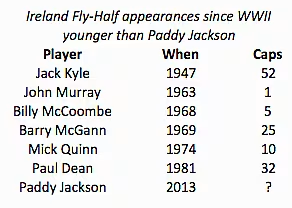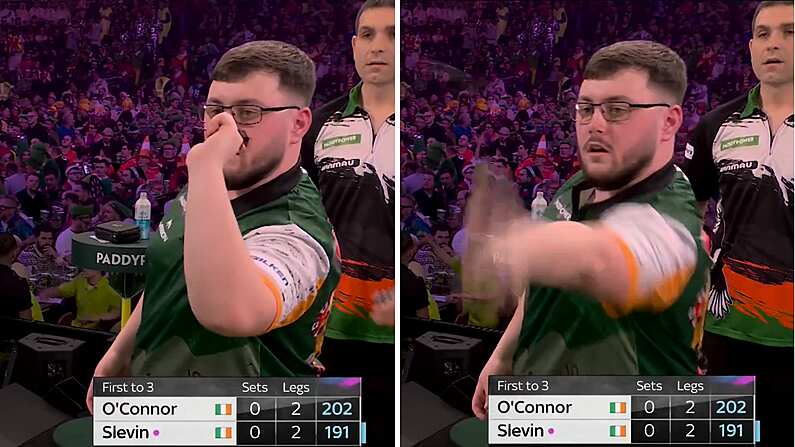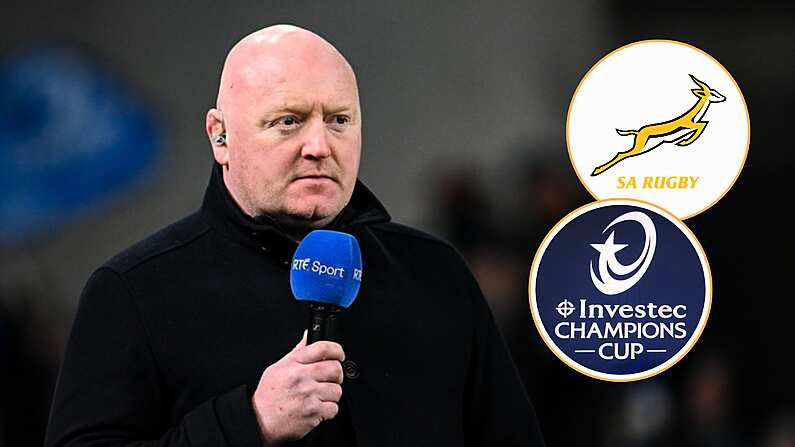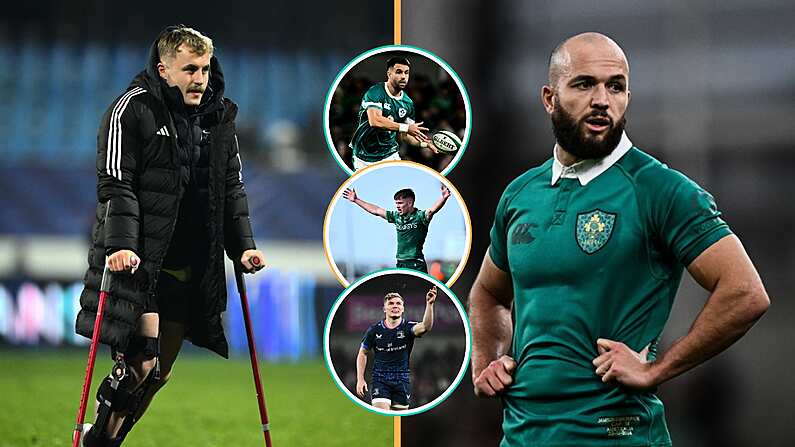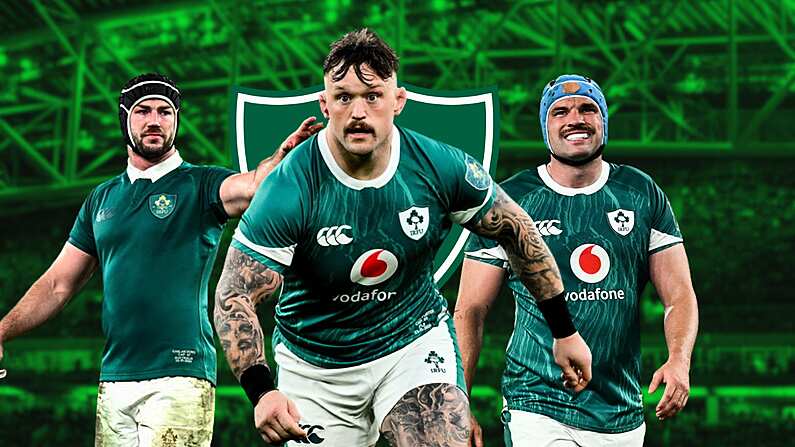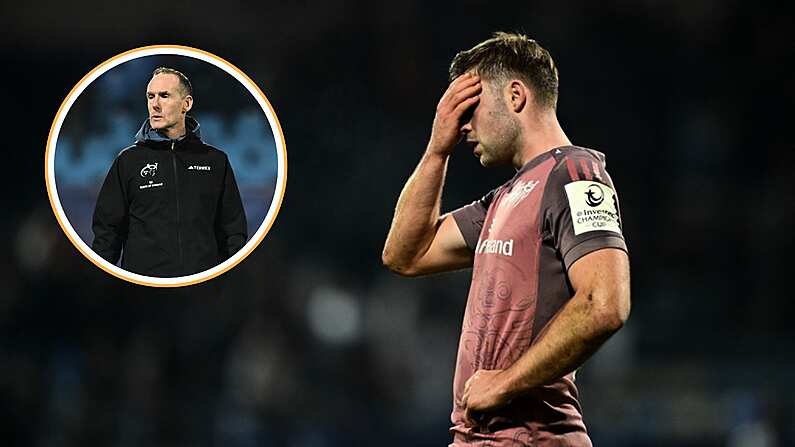Analysing Declan Kidney's decision to SUFTUM and how how this Ireland team featuring 5 Ulstermen will fare against the Jocks
In the 10 days after the England game, I assumed that Deccie would live up to is conservative reputation and pick his PBC prodigy at out-half, move BOD to inside-centre and play Earls at 13. I thought dreadful thoughts about the man who brought us our only Slam in the better part of 3 generations and was prepared to pen a rant explaining just why his selection was so bad for Irish rugby.
And then, on Tuesday evening, Kidney summoned Brendan Fanning to his table at Carton House to give him the news that ROG would continue to shine the pine at Murrayfield next Sunday. My Twitter timeline went ballistic, Conor George had a breakdown, entertaining us all by doing it publicly in the sports pages of the Indo.
So now I feel bad about my evil thoughts, particularly as Deccie has picked 5 Ulstermen in the starting XV. There was a time when Ulster fans would have complained if only 5 had been selected, especially in the days of Carr, Matthews, Ringland, Crossen, Anderson and Davey Irwin. But it has been so long since we had so many in the team (1999 – the year we won the European Cup)1 that we Ulster fans are delighted that Kidney has finally decided to SUFTUM.
The media is full of articles about Deccie’s gamble on an untested fly-half to steer Ireland through the tricky, must-win fixture against the rejuvenated Jocks. You would have to go a long way to find a pundit or former player who would have forecast or recommended Paddy Jackson’s selection. But what was Kidney to do? Having watched ROG struggle badly against England, he must have hoped that the Munster legend would play himself back into form at the Parc y Scarlets last Saturday. Instead, Munster were woeful, and O’Gara was totally out-shone by a relatively unknown youngster, who kicked goals from all over the park whilst the great one missed 2 from in front of the sticks.
I bow to no one in my admiration of ROG. 127 caps is an extraordinary achievement and he has helmed Ireland through the most successful period in our history. Add to that his heroics in the red of Munster, and I would happily sign the petition to erect a statue in his honour. Class is permanent, as Conor typed through his tears, but the body’s deterioration eventually catches up with everyone, which is why Ollie Campbell won’t be kicking us to victory on Sunday. O’Gara is fading fast, as evidenced by his shocking touch-finder shortly after he came on for J10 2 weeks ago. He has had hamstring problems this season and it shows. We especially need an out-half who can get some length on his kicks, because Scotland have the excellent Stuart Hogg who will return it with interest, a la Hugo MacNeil in his pomp.
So I agree with Kidney’s decision to go with youth although I would have been equally happy to go with Madigan. There is no doubt that Jackson has been a bit hit and miss this season and will not have the comfort of having Pienaar and Paddy Wallace either side of him to help him through the game. But he has been the first choice out-half for a team that leads the RDP12 and has qualified for the quarter-finals of the HEC. His class was clear for all to see when he came on in a pressure situation against Castres. He takes the ball much flatter than O’Gara, has fabulous hands and quick feet. His defence is solid, if not quite in the same league as Jonny’s and he has the ability to kick well from hand and tee – although he has wobbled at times. Deccie reckons he has what it takes and I see little to suggest otherwise. Let’s hope that it goes well for him on Sunday because we need a quality back-up for Jonny.
Luke Marshall’s selection appeared to be much less controversial, even though he, like Gilroy, has yet to cement a starting berth for Ulster. It seems the Ireland coaching team rate him highly but one has to feel for McFadden who performs at a sustained high level for Leinster, but is a victim of his own versatility. However, throughout the season, and especially against Fiji, Marshall has demonstrated that he is a quality footballer with the ability to break tackles and free his hands to offload. Given the fragility of the Scottish midfield, he could have an enjoyable debut – let’s hope so.
Tom Court’s return to the fold has got some Limerick folk spitting and Simon Lewis of the Examiner seems particularly peeved that he leap-frogged Kilcoyne. I thought that Kidney’s explanation was sound. To paraphrase, he sees Killer as an impact sub, and is looking for a more solid scrummager to take it to the Scottish scrum, weakened by Euan Murray’s refusal to play on the Sabbath. Court, unfairly pilloried for the debacle at Twickenham last season, has been in stunning form for Ulster and his schooling of Michael Bent was one of my highlights of the season so far (I suspect that Greg Feek doesn’t agree with that). In my view he was unlucky not to be in the squad up until now and more than deserves his place.
So we head to Murrayfield with a weakened team and a callow looking back-line. Ireland will do well to win what has historically been a very tough fixture. Scotland are very confident after a comfortable win against Italy, but they have their weaknesses. If Ireland can remind them of these early on, then we should be fine.
1 This is the result of ½ hour of internet research. I should be delighted if someone can provide me with the definitive answer.
According to many pundits, both professional and armchair, Declan Kidney has taken a massive gamble in picking 21-year-old Paddy Jackson as Ireland's out half against Scotland on Sunday.Since World War Two the list of 21 year old Irish out halves is not a long one. Jack Kyle, born in Belfast in January 1926, won his first cap in January 1947 just two weeks after his 21st birthday; that's about six weeks younger than Jackson is now.
Since that day in 1947 just five other men have been named at fly-half for Ireland at Jackson's age or younger:
On Sunday when Jackson runs out wearing the number ten shirt at Murrayfield, take note; it's something that hasn't happened in 32 years, not since Paul Dean played as a 20 year old against South Africa in Cape Town in 1981.
In the two weeks since Ronan O'Gara had what an Australian might call a "very average" performance against England, the focus has been concentrated on the decision2 for the number ten shirt. That's understandable. Ronan O'Gara is a rugby deity and Paddy Jackson is,well, young.
However, on Sunday afternoon when the anthems are playing in Edinburgh, Jackson will be joined by Luke Marshall who is somewhat shockingly short of experience in anything approaching big games. In terms of big game experience Jackson is light years ahead of his fellow Ulsterman playing at 12.
Both Jackson and Marshall played the full 80 minutes in Thomond Park against Fiji last Autumn and both played well. They looked comfortable in the green jersey even if it wasn't designated as a full test match.
To be clear, Marshall's a superb talent. Solidly built but with excellent distribution skills, as befitting a former schools out half, he's clearly got the potential to be a test player.
Luke Marshall has played a total of 41 minutes of Heineken Cup rugby, never more than 12 minutes in one game.
Paddy Jackson has played in a Heineken Cup semi-final and final; he's been the Ulster starting 10 this season apart from the final pool match in Castres when a Paul Marshall/Ruan Pienaar axis was chosen instead; even then Jackson played the final 26 minutes.
But should we care about Luke Marshall's lack of Heineken Cup experience? With the greatest of respect for the Scottish players and the country's long rugby tradition, they are not the All Blacks. Eleven of the starting fifteen men play for Glasgow and Edinburgh every week in the Pro 12; in all just five of the 23-man match day squad play their club rugby outside Scotland.
Ability is one thing, intensity is another. Test rugby carries with it its own jump in both physicality and pressure. It will be very interesting to see how Marshall copes with that as he's faced very little like it before.
To conclude, back to Paddy Jackson and Declan Kidney's "risk" in picking him. Picking Jackson isn't a risk; for the good of Irish rugby picking anybody younger than O'Gara is actually a necessity.
Picking Marshall over, say, Fergus McFadden who could also have doubled as place-kicker on the day either instead of or alongside Jackson is certainly a risk. After all, with McFadden not even in the squad on Sunday, if Jackson happens to look shaky from the placed ball Declan Kidney has effectively ensured that he'll have to introduce Ronan O'Gara no matter how well Jackson might be playing otherwise.
In the 2011 Rugby World Cup quarter final Declan Kidney replaced his starting fly-half by picking Ronan O'Gara over Jonathan Sexton. It was not a success. The Six Nations takes place every year but after that quarter final match Ireland had to look at four more years before they'd have another crack a World Cup.
On Sunday with the two young Ulstermen playing at 10 and 12 Ireland will have taken a big stride towards 2015 no matter what the result against Scotland might be.
The similarities between this match with Scotland and the one 13 years ago are uncanny. Will the result follow suit?
Thirteen years ago, almost to the day, an Ireland team in desperate need of a Six Nations win took on Scotland. The team had just endured a gut-wrenching loss to England, and injuries had been shipped, so changes were made. Among those winning his first cap, a young out-half with one A team appearance, stepping into a spot vacated by a man who'd just won the Heineken Cup. Alongside him in the backline, a team-mate he knew well, also making his debut. Then it was Ronan O'Gara and Peter Stringer.
Over a decade later, it’s Paddy Jackson and Luke Marshall who’ll be winning their first caps.
The similarities between then and now are uncanny. Let's hope that continues this Sunday - in 2000, Ireland romped to a 44-22 win in a game which kick-started a period of success spear-headed by that golden generation.
O'Shea, Maggs and Bob Casey were all out hurt for that game at the old Lansdowne, and this (as well as a Twickenham thrashing two weeks previous) saw Warren Gatland ring the changes (John Hayes, Simon Easterby and try-scorer Shane Horgan also won their first caps that day). Those who came into the team made the most of their opportunities and became mainstays into the O'Sullivan era, and in some cases beyond. Speaking at the Ireland team announcement this week, Jamie Heaslip said he feels those 'lesser' lights playing this weekend have that same opportunity to prove themselves, and anyone who doubts that need look back to this game for proof.
There doesn't seem to be the same level of burgeoning talent now as there was in 2000, but I imagine any pundits who would have predicted the success that was to come would probably have been diagnosed with the Y2K bug. Worries about young players have existed for many a year, and while the focus is on the Ulster debutants, there's no doubt that the current Irish team is largely lacking the calming effect of the 'been there, done that' brigade. Thirteen years ago, before kickoff against Scotland, Mick Galwey was captured in an iconic photo standing shoulder to shoulder with Strings and ROG. Those who aren't new to the Ireland setup may need to do the same. They also have to be ready to stand-up and be counted, even from the bench. Remember, O'Gara struggled in the opening part of his debut, and the team's fortune only truly turned when he was replaced by David Humphreys. Ironically, we may need ROG to fill that same role at Murrayfield.
Is it a gamble by Declan Kidney to go with youth over experience? Absolutely, but I believe it's one with great potential. I also think it's a move which actually helps preserve his future as coach. His biggest knock has always been conservatism, but Sunday marks a shift in thinking. Did he intend to do this all along? Probably not, but given that seven of Sunday's starters lined out against Fiji in the A game in November and three more of that team are now on the bench, he could argue to the IRFU paymasters that this is part of a larger overall plan. The more dangerous decision, with the coach's own future in mind, could have been to go with more of the same. If Sunday goes well, it's a major string to his bow in contract talks, and a badly needed one too.
We all hope the gamble pays off, of course, and I'm optimistic it will, though the perceived gap between Ireland and Scotland has narrowed considerably in the last three weeks. If you take a step back though, this is still an Ireland team (with changes) who were brilliant for parts of their game with Wales and a Scotland side decimated against England. It's a difficult encounter, it's almost certain to be a nervy one, but sometimes youngsters who know no different can be the least affected by the wise heads who know what's at stake. That, I'm sure, will be the hope of the Irish faithful, and the man leading their team, who's rolled the proverbial dice in a big way.
A look at the other talking points dominating the weekend's rugby
"Where's your fucking pride?": Bottom of the table with no wins is the last place most would've expected the French to find themselves. The rest of this Six Nations will be about clawing back some pride. France have made a startling 8 changes to the team that lost so abysmally to Wales (one of the worst Six Nations games in memory). After messing around with his backline, Philipe Saint-Andre has gone with the shock move of playing his best players in their actual positions. To that end Wesley Fofana moves from the wing (where he's barely touched the ball in 2 games) into the centre and Europe's best scumhalf Morgan Parra comes off the bench to partner France's best outhalf Francois Trinh-Duc. Having France's second highest try scorer of all time, Vincent Clerc, fit again is a bit of a bonus too.
It will be difficult to arrest their slide mid-tournament and Twickenham is not a place where France find much success (their last win at English HQ was 2005). PSA did manage to get last weekend off for his 23 after complaining bitterly about the tiredness of his players and lack of preparation time. A more recognizable back line and a little general at 9 should lead to improvements.
Position of Strength: Stuart Lancaster can do what he wants right now. Sitting on top of the table, the only team who can win the Grand Slam, gives a coach leeway and immunity from criticism. Such is Lancaster's position of strength now that dropping Tom Youngs and Billy Twelvetrees is viewed as a brave reshuffle rather that a row back on his stated policy of the young players keeping their spots when playing well. But Lancaster has earned his freedom. He has created a hardworking, dogged and controlled team. They may not have shot the lights out at the Aviva but England never looked like losing the game. From what we've seen of England and France so far, this is going to be a serious battle up front and England have shown an aptitude for control and accuracy so far.
Rejuvenation?: It was an appalling game of rugby but the Welsh won't care a jot after coming out on top in Paris. In the end it took one cross-field kick and finish to end 9 months of misery for Wales. Playing Italy couldn't come at a better time for them as they try to consolidate that victory and get some momentum going. Rob Howley made the unusual (and smart!) move of naming an unchanged Welsh team for Saturday a full 10 days before the game thus avoiding the inevitable Warburton/Tipuric debate. The Ospreys openside gets his chance to show that he can dominate a Test in the way that Warburton did previously. Wales have played poorly for much of the last six months but it's difficult to see an Italy shorn of Parisse competing with them. Wales need to really dominate in Rome to show that they're returning to their best.
With Scotland away and England at home, they might just fancy a tilt at retaining the Championship yet.
Bad Romance: The romantic in me was thrilled with Italy's win over France on the first weekend and I was hopeful that they could back it up in Scotland. Alas, all the accuracy they had shown in Rome deserted them second time out and they coughed up to turnover tries that allowed the Scots to skip away. Without the suspended Sergio Parisse for the rest of the tournament and Luciano Orquero returning to the form we'd expect of him, it's starting to resemble the traditional uphill struggle for the Italians Wales' dire run of form and their desperation to keep winning should make them less open to complacency than the French. It will take a performance even great than their first to get a win.
Rugby on Balls.ie brought to you by the O2 Online Shop

